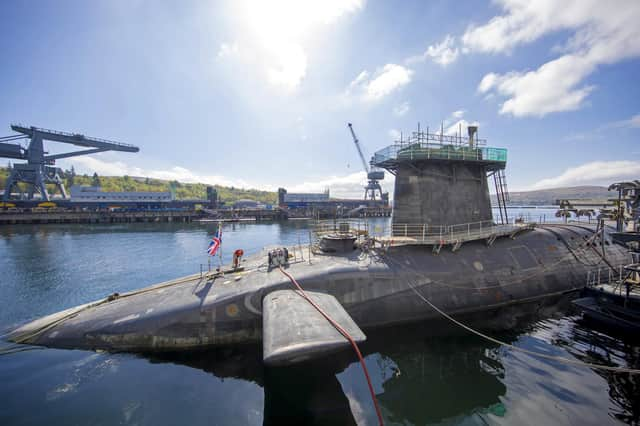Nuclear weapons in Scotland: UK government must be more open about safety events after dramatic rise – Scotsman comment


It will, therefore, be a concern to many to learn that the average number of nuclear safety events at Scotland’s naval bases has risen dramatically, from about 66 a year between 2006 and 2017 to 148 a year between 2018 and 2020.
UK defence minister Jeremy Quin sought to play down the significance of the incidents, saying no one was hurt and that there was no “unauthorised” discharge of radioactive waste into the environment. The Ministry of Defence added that “the majority” of the incidents listed were “low level”.
Advertisement
Hide AdAdvertisement
Hide AdReading between the lines of these statements suggests that there were “authorised” discharges of radioactive waste and that some events were higher than low level, whatever that means.
The problem for the UK government is that the lack of clarity about what actually happened and the apparent unwillingness to explain allows others to fill in the blanks.
And Deidre Brock the SNP MP who obtained the figures, was happy to do so, saying they revealed an “appalling safety record” that “should not be tolerated”.
“An error on the Clyde could result in utter devastation for Scotland, with enormous numbers of casualties and effects lasting long beyond the lifetimes of anyone living in Scotland today. That makes these ongoing – and increasing – nuclear safety events terrifying,” she added.
She also questioned what the “aggregate effects” would be on people who work at the bases or live nearby and the environment.
Part of the problem is the way the nuclear site event reports or NSERs are described. Three of the incidents were classed as “category B”, which the MoD defines as having “actual or high potential for radioactive release to the environment of quantities below IRR99 [Ionising Radiations Regulations]”.
This may be useful to experts in the field but it does nothing at all to help the general public understand the seriousness of what happened.
According to Dr Richard Dixon, director of Friends of the Earth Scotland, there were at least 18 cases in which radioactivity was “almost certainly released to the environment”.
Advertisement
Hide AdAdvertisement
Hide AdWhy can the MoD not simply set the record straight? For obvious reasons, there has to be a fairly high degree of secrecy about our nuclear arsenal, but the lack of openness about safety incidents does little but feed suspicions that something is not quite right.
If all is well, they should demonstrate this to the public’s satisfaction.
A regular report with as much detail as is safe to reveal about each incident in language that we can all understand would soon slip into the background noise of public discourse if there truly is ‘nothing to see'.
And the spotlight of publicity could well help focus minds on the importance of safety. Those working at the bases are unlikely to need such assistance – we have no doubt about their professionalism and commitment – but the people who control the purse strings and their political masters could well benefit from this greater scrutiny, however irksome it might seem to them.
A message from the Editor:
Thank you for reading this article. We're more reliant on your support than ever as the shift in consumer habits brought about by coronavirus impacts our advertisers.
If you haven't already, please consider supporting our trusted, fact-checked journalism by taking out a digital subscription.
Comments
Want to join the conversation? Please or to comment on this article.
